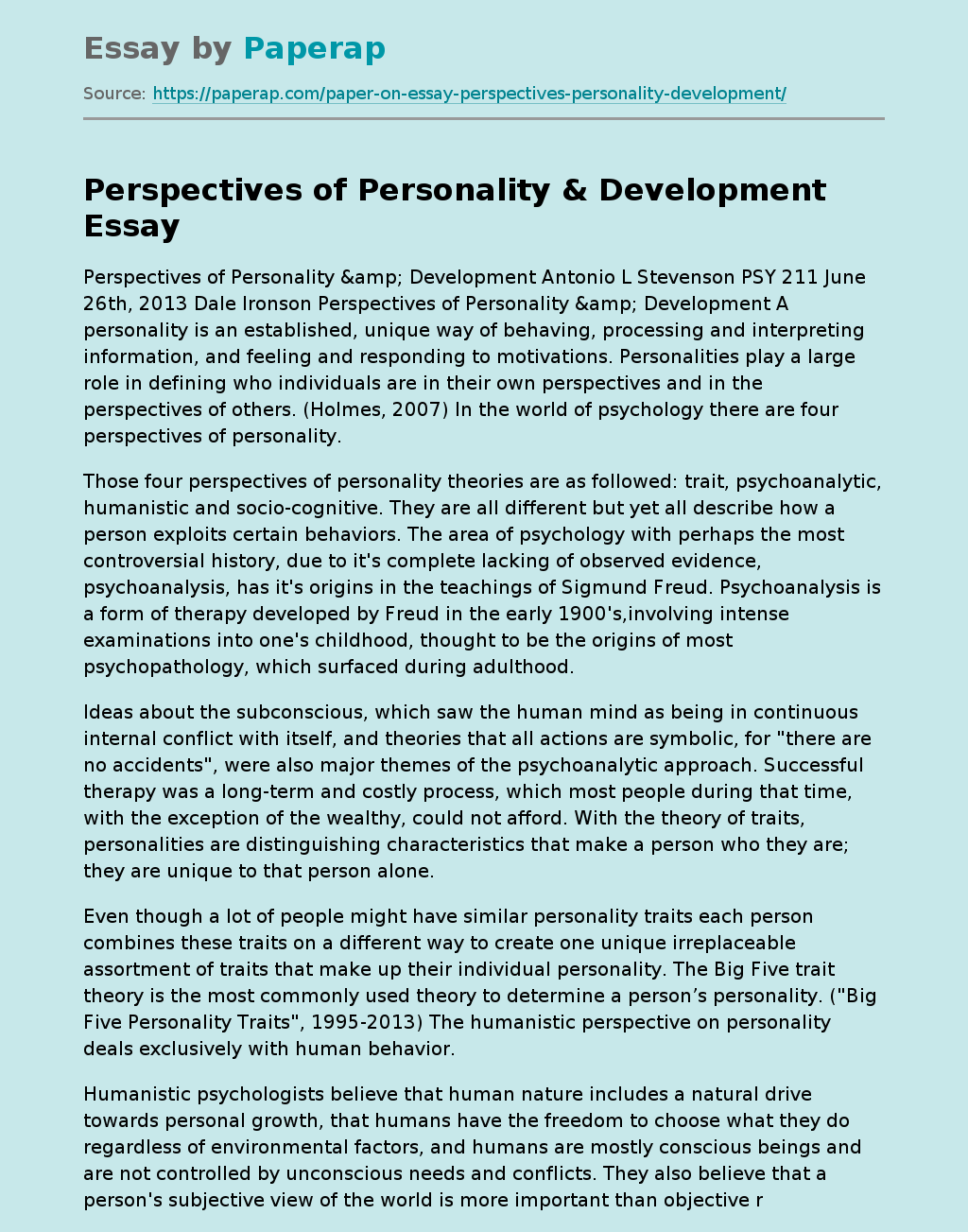Perspectives of Personality & Development
Perspectives of Personality & Development Antonio L Stevenson PSY 211 June 26th, 2013 Dale Ironson Perspectives of Personality & Development A personality is an established, unique way of behaving, processing and interpreting information, and feeling and responding to motivations. Personalities play a large role in defining who individuals are in their own perspectives and in the perspectives of others. (Holmes, 2007) In the world of psychology there are four perspectives of personality.
Those four perspectives of personality theories are as followed: trait, psychoanalytic, humanistic and socio-cognitive.
They are all different but yet all describe how a person exploits certain behaviors. The area of psychology with perhaps the most controversial history, due to it’s complete lacking of observed evidence, psychoanalysis, has it’s origins in the teachings of Sigmund Freud. Psychoanalysis is a form of therapy developed by Freud in the early 1900’s,involving intense examinations into one’s childhood, thought to be the origins of most psychopathology, which surfaced during adulthood.
Ideas about the subconscious, which saw the human mind as being in continuous internal conflict with itself, and theories that all actions are symbolic, for “there are no accidents”, were also major themes of the psychoanalytic approach. Successful therapy was a long-term and costly process, which most people during that time, with the exception of the wealthy, could not afford. With the theory of traits, personalities are distinguishing characteristics that make a person who they are; they are unique to that person alone.
Even though a lot of people might have similar personality traits each person combines these traits on a different way to create one unique irreplaceable assortment of traits that make up their individual personality.
The Big Five trait theory is the most commonly used theory to determine a person’s personality. (“Big Five Personality Traits”, 1995-2013) The humanistic perspective on personality deals exclusively with human behavior.
Humanistic psychologists believe that human nature includes a natural drive towards personal growth, that humans have the freedom to choose what they do regardless of environmental factors, and humans are mostly conscious beings and are not controlled by unconscious needs and conflicts. They also believe that a person’s subjective view of the world is more important than objective reality. Two of the humanistic theorists that have made an impact of humanism are Carl Rogers and Abraham Maslow. (Holmes, 2007) Psychologists use the method of personality assessments to test personalities.
Testing personalities is much like testing intelligence and because it measures something that is intangible and invisible it can be quite the difficult task. There are different theories of personalities and different methods of assessing those personalities; however some methods of assessment are shared between theories. The four theories are psychodynamic, humanistic, trait and social learning and all have different roots. The methods of assessment are projective tests, personal interview, objective tests, and direct observations. “Personality Psychology”, 2007) The projective tests consist of simple unclear stimuli that can elicit an unlimited number of responses. The personal interview is used to obtain information from the person being interviewed and can be structured or unstructured. An objective test is generally a written test that is administered and scored according to a standard procedure. Usually the tests require simple yes or no responses or for one answer among many to be chosen and are widely used.
Direct observation observes a person’s actions in everyday situations over a long period. To assess the psychodynamic theory the methods of projective tests and personal interviews is used. To assess the humanistic theory objective tests and personal interview are used. To assess the trait theory objective tests are used. Social learning theory is assessed with the use of interviews, objective tests and observations. (Cherry, 1999) Direct observation observes a person’s actions in everyday situations over a long period.
To consider the psychodynamic theory the methods of projective tests and personal interviews is used. To evaluate the humanistic theory objective tests and personal interview are used. To calculate the trait theory objective tests are used. Social learning theory is assessed with the use of interviews, objective tests and observations. (Cherry, 1999) The value from all of these valuations is that the examination and its results will generate truths that will be later used to determine ones psychological significance of patterned behavior and consistencies.
With the bulk of test that a psychologist can administer, he or she can use the result to evaluate a structure of her client personality. Are they conditioned, effected by their childhood, fearful of self honest are all of the answer that can be answer by the conduction of these test. The issues need to be considered with some personality assessments are how was the foundations of the test shepherded and logic of why it was conducted. Under what circumstances was the test directed? What purpose does it serve? Are the test based on knowledge, which is subjective, and cognitive?
And if so, how do we find the behavioral stipulations? Are these outcomes from the test proclamations of accuracies or are they products of a person’s way of thinking and or feeling at that given moment. Do these test come off as impersonal and organizationally unconnected to what the psychologist’s test may be fashion towards? These are the various inquiries that can be questioned when considering participating in some personality valuations. The reactions to these questions may forewarn and allow the client to plan what is to come.
Reference Holmes, T. (2007). What Are the Four Basic Theories of Personality?. Retrieved from http://www. ehow. com/info_8145170_four-basic-theories-personality. html Big Five Personality Traits. (1995-2013). Retrieved from http://www. sevencounties. org/poc/view_doc. php? type=doc&id=8948 Personality Psychology. (2007). Retrieved from http://www. therapytools. us/course_article. php? course_id=138 Cherry, K. (1999). What Is a Projective Test?. Retrieved from http://psychology. about. com/od/psychologicaltesting/f/projective-tests. htm
Perspectives of Personality & Development. (2019, Jun 20). Retrieved from https://paperap.com/paper-on-essay-perspectives-personality-development/

